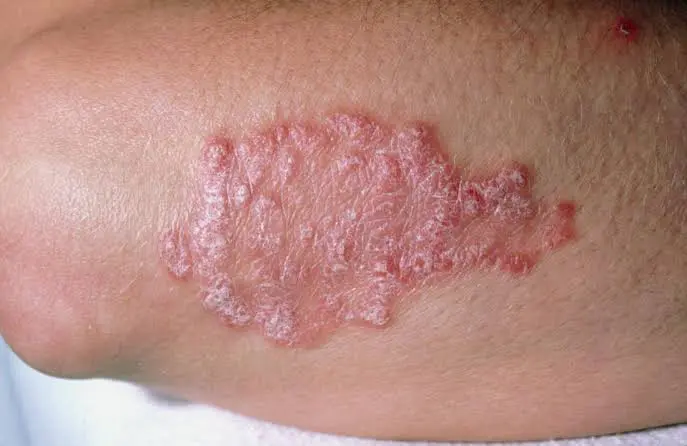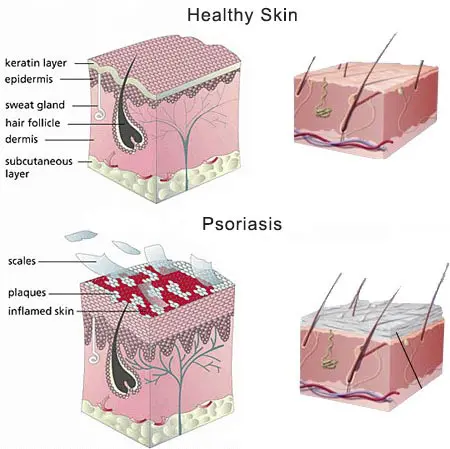Psoriasis is a very common autoimmune skin disease. It is persistent, unpredictable and baffling. This skin disorder affects 3% of the population across the globe. This condition can impact the whole body, can happen anywhere. Right from the scalp to legs. Treatment helps but the disease never leaves a person. The complicity of the disease is known to all. Ayurveda also talks about a condition, similar to this and says this condition is treatable. We will discuss the condition in detail and talk about the ayurvedic treatment of psoriasis.
Psoriasis is a chronic skin condition characterized by dry, thick, red silver and scaly plaques on the skin surface. Most of the time, these patches are dry and itchy. But in a few cases, there can be some watery fluid from these rashes.
A typical psoriasis patch is-
- These are raised, from the skin level.
- The color of the patches is Reddish.
- Covered with the scales.
- These scales keep on shedding off.
- Often these are itchy as well as painful.
- Sometimes these rashes crack and bleed.

Facts on Psoriasis
- Psoriasis is not contagious or infectious
- It is a long term skin inflammatory disease
- Psoriasis mostly affects scalp, elbows, and knees but may also affect soles of feet, palms, and torso.
- It is an immune-mediated skin disease where the body starts making new skin cells rapidly in days rather than in weeks.
- Anyone at any age may develop psoriasis. However, it is more likely to appear between 50 to 35 years of age.
- Men and women are at equal risk of developing it.
- Psoriasis is a lifetime disease with periods of flare-up and remissions of the symptoms.
- The length of flare-ups may differ with periods of remission in-between.
- Remission periods may vary from one to 12 months. Between these periods, the symptoms clear up.
- Prediction of periods or flare-up and remission is a challenge.
Symptoms of Psoriasis
The symptoms of psoriasis differs from person to person and depends upon its type.
The common symptoms of psoriasis include:
- Red patches on the surface of skin with silvery scales
- Scales may be in small spots
- Dry and cracked skin
- Itching, soreness, bleeding and burning
- Ridged, pitted, or thickened nails
- Stiff and swollen joints
Psoriasis may show up anywhere including skin folds, feet, nails, lips, mouth, eyelids and ears. Mild cases cause itchy and dry skin on the scalp. Severe cases are progressive and covers the larger areas of the body.
The range of symptoms of Psoriasis depends upon its type. There are about eight types of Psoriasis depending upon their location and the appearance of the scales.
Types of Psoriasis
There are different types of psoriasis. This classification is based on the presentation and location of the disease. Here are different types of the disease. The treatment plan from Ayurveda perspective changes a bit, as per the type of psoriasis. Ayurveda doesn’t talk about any subtypes. So we do consider, the same classification provided by western medicines.
Plaque Psoriasis
It is the most common type of psoriasis and is characterized by raised and patches on the skin with silvery-white scales. It mostly affects knees, lower back elbow, and scalp. The skin may crack, bleed, itch and sore. The itching is intense during the night. Scratching makes the condition worse and plagues thicker. This type of psoriasis is more common in adults.
Scalp Psoriasis
Scalp psoriasis affects about half of the population suffering from psoriasis. It forms white or silver and powdery flakes on the scalp. The skin of the scalp becomes crusty. Plagues may cover the whole head including the back of the neck, ears, and forehead.
Inverse Psoriasis
In inverse psoriasis bright, shiny, red and sore lesion forms without silver scales. Mostly the lesions appear under the skin fold such as under the breast, genitals, behind the knees, and armpits. Sweating and rubbing make the symptoms worse.
Erythrodermic Psoriasis
It is a life-threatening condition that requires immediate hospitalization. Symptoms include periodic and fiery red skin with a shading of the scales in sheets. Other severe symptoms are severe itching, rapid heartbeat, painful skin and feeling too hot or too cold. Erythrodermic psoriasis is triggered by severe infection, certain medications, sunburn and withdrawal of psoriasis treatment.
Pustular Psoriasis
Here red and swollen patches with bumps filled with pus are formed. With time, the pustules dry and become yellow Brown. If blisters open, the skin becomes sore and cracked. Pustular psoriasis develops due to stress, exposure to certain chemicals, certain medications and infection. It occurs mostly on palms or the bottom of the feet.
If this condition occurs along with muscle weakness, fever, chills, rapid pulse and spread quickly with severe itching immediate hospitalization is required.
Guttate Psoriasis
Guttate psoriasis mostly affects young adults and children. It affects 10 in every 100 patients suffering from psoriasis. It appears as small, red-colored dots with raised edges in the middle of the body. However, it also may appear on the scalp, ears, arms, legs, and face. The common trigger behind guttate psoriasis is upper respiratory tract infection, stress, skin injury, strep throat, cold, tonsillitis or flu. In addition, it may follow antimalarial treatment and the use of Beta-blockers.
Psoriatic Nail Disease
Half of the population suffering from Psoriasis develops psoriatic nail disease. The skin under the nails become thick. Yellow or brown-red spots form under the nails. Nails often crack or split. Tiny Dent may be present on the nails surface. In severe condition nail crumbles and falls.
Psoriatic Arthritis
About one-third of the population suffering from psoriasis also suffers from stiffness, swelling and pain in the joints. If skin psoriasis and arthritis occur together, it is ‘psoriatic arthritis’. In most of the cases, the symptoms of skin psoriasis are first to come. In addition, there may be color changes and crumbling of nails. This is detailed under the autoimmune conditions, with psoriatic arthritis.
What Causes Psoriasis
The cause of psoriasis is unknown. However, genetics and the immune system play a vital role in its development.
Risk Factors for Psoriasis Includes:
- Obesity – There are evidences that obesity predisposes the development of Psoriasis. Nevertheless, it is not clear whether obesity precedes psoriasis or vice versa.
- Smoking – smokers are at high risk of developing psoriasis. In addition, smoking makes this condition worse.
- Certain Medications– Research has found a link between psoriasis and certain medications such as:
- Beta-blockers
- Tetracycline
- Nonsteroidal anti-inflammatory drugs
- Malaria drugs
- Bacterial or Fungal Diseases – Patients suffering from HIV are at greater risk of psoriasis. Children with recurring infections and frequent sore throat are at higher risk. The reason behind is that frequent infections weaken the body immunity.
- Genetics – If you have a family history of psoriasis, you are more likely to develop it. If one of the parents has psoriasis, there is 10% chance for the child to get it. If both the parents have psoriasis the child is at 50% of developing risk to develop this skin condition.
- Injury– Areas of skin that are injured or traumatized becomes sites of psoriasis. However, not everyone who has psoriasis develops it at the site of an injury.
How Psoriasis Occurs
Psoriasis is a skin condition where the changes occur in the life cycle of the skin cells due to active lymphocytes or specialized white blood cells. In general, the T-cells or Lymphocytes attack foreign bodies to keep our bodies healthy. In patients suffering from Psoriasis, the T-cells mistake healthy skin cells as foreign bodies and start attacking them. As a result, the skin cells on the surface proliferate excessively and rapidly. There is an overproduction of white blood cells, T-cells and new skin cells. The growth of the skin cells is so rapid that our body is unable to remove or shed them. The underlying extra skin cell dies on reaching the skin surface and form raised, thick and red plagues with white silvery scales.

Ayurveda About Psoriasis
Because something is curable in western medicines, doesn’t mean “it will be incurable in Ayurveda too.”
I make this remark on this condition of psoriasis, very frequently, when it comes to the Ayurvedic treatment of psoriasis.
Ayurveda has a different understanding about this skin disease, we are discussing here. Psoriasis comes under a complete set of skin diseases, we refer as “Kushtha” in Ayurveda.
This Sanskrit word (Kushtha) covers almost all the conditions where skin lesions and rashes appear. But how can dermatology be covered under just few verses of Sanskrit? This is always my reasoning towards this observation by senior Ayurveda physicians.
Ayurveda talks about the seven Dhatu theory. These dhatus nourish each other step by step. And this Agni between these dhatus, which helps in this transition and conversion.
The first and foremost thing which comes up from the food is- Rasa. And this Rasa is responsible for the skin.
When I say responsible for skin, it directly converses-
Health of the skin is all about, healthy digestion, healthy food, the correct method of eating.
This is the basic, things which applies on all the skin disease. And in clinical practices when it comes to treat the condition like psoriasis, I have learnt, “proper diet changes” helps the patient better than medicines.
Therefore, we need to look at the things more elaborately. Wider than the aspect of Kushtha, alone.
Kitibha is something, which is mostly considered as- Psoriasis in Ayurveda.
And amazingly, this condition- Kitibha is something which comes under condition of Khsudra Kushtha. Something which is easiest to cure!!
Yes, you read it right.
If we look at Kitibha as an Ayurvedic condition and check its prognosis. Psoriasis is completely and easily curable.
But it is not so!!
Means, we are on a wrong track.
We need to change our perception and understanding both.
With this, we need to find the answer first-
Can Ayurveda cure Psoriasis?
Yes, if psoriasis is Kitibha- it can be cured with few medicines in 15 days.
But it is not so.
When it comes to psoriasis. It is a complicated condition. It takes a lot to treat this condition. Because psoriasis sticks badly to the skin. And when it keeps on disturbing the whole human body.
In cases psoriasis starts impacting the joints and it is known as- Psoriatic Arthritis.
When it comes to Ayurvedic treatment of psoriasis, as per my experience it is not easy to cure the condition of psoriasis.
Ayurvedic treatment helps in all way to treat the condition. But treatment is always lengthy and it takes a lot of efforts from the patient too.
Ayurvedic Treatment of Psoriasis
Ayurveda treats the cause. Therefore when we take the case of psoriasis, we consider the same.
The root cause is unhealthy- Rasa Dhatu. The first conversion of food for the body.










